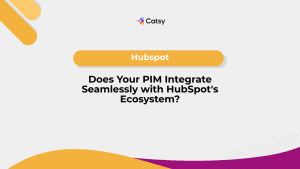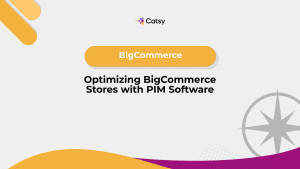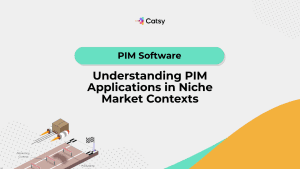
Table of Contents
What You'll Learn:
- What free PIM tools exist for small Shopify stores
- The pros and cons of freemium and open-source options
- When free solutions become more of a burden than a benefit
- How Catsy helps stores grow without catalog chaos
- Which solution is right for your current size and future vision
1. Introduction
Each Shopify merchant starts their journey with a small crew. At first, managing products is simple to do using spreadsheets or by inputting directly into Shopify. But as your catalog expands, your nimble vessel can start to feel like it’s taking on water.
That’s where Product Information Management (PIM) tools come in.
Free PIM solutions do exist, typically in the form of open source platforms or freemium plans. These can be quite appealing for small shops that wish to stick to a budget. But do they really offer the navigational tools you need?
Let’s explore your options, understand the tradeoffs, and chart a course toward smart, scalable product content management.
2. Why Small Shopify Stores Need a PIM
A. The Myth: “I’m Too Small for PIM”
Many small merchants assume that PIM tools are only for large enterprises with huge catalogs and multiple channels. That’s simply not true! That’s like saying that only ocean liners need charts… even a single-mast sailboat needs a compass.
Even with just 100 SKUs, Shopify stores can experience:
- Inconsistent product data
- Missing attributes
- Poor SEO metadata
- Image mismatches
- Manual duplication across variants
B. Early Chaos that Derails Growth
The earlier you adopt structured, centralized data, the smoother your voyage will be.
“Clean, consistent product data is foundational to e-commerce success. It drives search visibility, conversion, and operational efficiency,” — Salsify
Waiting too long to implement a PIM system can cause growing pains. Your teams will complete redundant work that can lead to errors. In turn, those errors can cause delayed or rejected listings, slower product launches, and difficulties in expanding into new markets.
3. Types of Free PIM Tools Available
A. Open Source vs Freemium
So, it’s time to implement a PIM and you’d like to explore your free options. There are two primary categories of free PIM software. Let’s take a look.
Type | Description | Ideal For |
Open Source | Community-developed, self-hosted software (e.g., Pimcore, Akeneo CE) | Technical users who can self-manage infrastructure |
Freemium | Limited-feature cloud apps with paid upgrade tiers (e.g., Plytix) | Small teams looking for easy entry points |
B. Common Features and Limitations
Feature | Open Source | Freemium |
Hosting | Self-hosted | Cloud-based |
Support | Community forums | Email/basic support |
Customization | High | Limited |
Onboarding | DIY | Guided (sometimes) |
Scalability | Requires dev ops | Requires upgrade |
Shopify Integration | Not always native | Basic sync only |
4. 4 Popular Free PIM Solutions for Small Stores
1. Plytix
Freemium Model
Plytix offers a free-to-use plan that will apply to up to 100 products and one user. This is ideal for very small stores, and the PIM includes basic product information management capabilities.
Pros:
- Clean user interface
- Product catalogs, data sheets
- Basic Shopify sync via CSV/API
Cons:
- Limited to 100 SKUs on the free plan
- Very limited bulk actions
- Shopify integration isn’t plug-and-play
2. Akeneo Community Edition
Open Source
Akeneo CE is a robust, open source PIM that’s used by global brands. The community version of this enterprise-grade system requires local installation and management.
Pros:
- Flexible data modeling
- Strong localization tools
- Scalable architecture
Cons:
- No official Shopify connector
- Steep learning curve
- Requires dedicated IT resources or tech know-how
3. Pimcore
Open Source
Pimcore is a multifunctional platform that offers PIM, DAM, and CMS capabilities. It’s highly customizable, but the customization is best left to developers.
Pros:
- Deep flexibility and extensibility
- Built-in DAM and workflow capabilities
Cons:
- Not Shopify-specific
- Complex user interface for non-technical users
- Hefty setup and maintenance burden
4. Ergonode
Freemium/Open Source Hybrid
Ergonode offers a modern interface and an open source backend with optional cloud hosting. This is truly a rising star for agile teams.
Pros:
- Lightweight UI
- Open-source code base
- Strong variant logic
Cons:
- Not fully Shopify-integrated
- Still maturing feature set
- Cloud version is paid
5. The Hidden Costs of Free Tools
Free doesn’t necessarily always mean free. Even if you’re not spending money on software, you may be spending time and introducing technical debt.
A. Time, Complexity & Technical Debt
- Open source tools need hosting, updates, patches, and technical troubleshooting.
- Freemium tiers often lack bulk editing, automation, or integrations – this can create more manual work.
- Data migration can become painful if you outgrow the system.
According to Gartner, the total cost of ownership for free software often exceeds that of paid tools when scaling is involved.
B. Lack of Support & Scalability
- No onboarding can lead to a steep ramp-up
- No SLAs or guaranteed uptime
- Growth often forces abrupt platform switches
If you’re serious about scaling your Shopify store, it’s important to make sure your tech stack is ready for what’s over the horizon.
6. When to Upgrade to a Paid PIM Like Catsy
A. Signs You’re Outgrowing Free
You may have outgrown your free PIM tool if:
- You hit SKU or user limits
- Your launches are delayed due to manual edits
- You want to list on multiple channels
- Your SEO performance is suffering
- You’re duplicating work across platforms
B. Return on Investment: Time, Sales & Accuracy
When you invest in a purpose-built, Shopify-first platform like Catsy, here’s what you get:
Benefit | Impact |
Centralized data | Fewer errors, better workflows |
Faster syndication | Launch products faster |
Built-in DAM | Save on 3rd-party storage |
Shopify-native | Smooth sync, including metafields |
Scalable pricing | Pay for what you use |
With a PIM, you’re no longer paddling upstream – you’re navigating with the wind.
7. Why Catsy Is Ideal for Scaling Shopify Stores
Catsy was built with you in mind – the growth-focused Shopify merchant who starts small but thinks big.
A. Shopify-First Architecture
- Native Shopify app
- Supports metafields, tags, variants, and syncing to Shopify Markets
- Real-time sync for fast updates and error reduction
B. Built-in DAM, Bulk Editing, & Channel Sync
- Link images, videos, 360s to products
- Validate missing or outdated fields
- Enrich multiple SKUs in bulk
- Export to Amazon, Walmart, and many more
C. Transparent Pricing and Onboarding
You’re not Goldilocks. Catsy offers packages that are sized just right for businesses at every growth stage. Whether you’re just starting out or are expanding to new markets, Catsy offers hands-on support and clear onboarding.
8. Case Example: A Small Store That Grew Up Fast
Company: Niche Accessories Brand
Size at Onboarding: 85 SKUs
Platform: Shopify
Challenge: Manually managing seasonal products and influencer bundles
Initial Setup: Using Plytix free plan and Google Sheets
Problems:
- Teams couldn’t bulk-edit descriptions
- Image linking required an external DAM
- Shopify listings often displayed errors
Switched to Catsy for:
- Variant grouping
- SEO templates
- DAM integration
- Shopify sync
Result after 6 months:
- SKU count doubled
- New collections launched 3x faster
- 92 percent error reduction in published listings
“Catsy helped us graduate from spreadsheets without breaking the bank. It made us feel like an enterprise brand even as a small team.”
9. Conclusion
Free PIM tools are useful anchors at the start of your Shopify journey. They offer structure and introduce good habits to your organization without the need for a huge investment.
But as your store grows, these free tools often can’t keep up. Knowing when to upgrade, and which PIM to choose, is critical to smooth sailing.
Catsy’s the compass that helps Shopify stores like yours plot a course for clarity. Whether you begin with 50 SKUs or 50,000, Catsy is ready to scale with you.
10. Key Takeaways
- Free PIM tools exist, but often come with feature and support limitations
- Open-source tools require technical resources; freemium tools limit scale
- Small Shopify stores benefit from PIM systems earlier than they expect
- Upgrading to a paid PIM like Catsy saves time, improves listing quality, and drives growth
- Catsy is ideal for Shopify merchants who want to future-proof their catalog
FAQs:
What is a free PIM software for Shopify?
Free PIM software options include tools like Plytix, Akeneo Community Edition, and Pimcore. These offer no-cost plans or open-source code for managing your product information.
Are open-source PIM solutions good for small businesses?
Open-source tools can be powerful, but they often require technical skills for setup and maintenance. They are best for teams with dedicated or skilled IT support.
When should I move from a free to a paid PIM tool?
Upgrade your PIM when your catalog grows, when you’re selling on multiple channels, or when you need more automation. SEO support and Shopify-native features are additional reasons to upgrade.
Does Catsy offer a free plan?
Catsy doesn’t offer a permanent free plan, but we provide scalable pricing and onboarding support that’s tailored to the needs of small and growing Shopify stores.
How does Catsy compare to Plytix or Akeneo?
Catsy was purpose-built for Shopify merchants. We integrated real-time sync, a built-in DAM, and a simple user experience. Unlike open-source tools, Catsy doesn’t require development or manual integrations.





